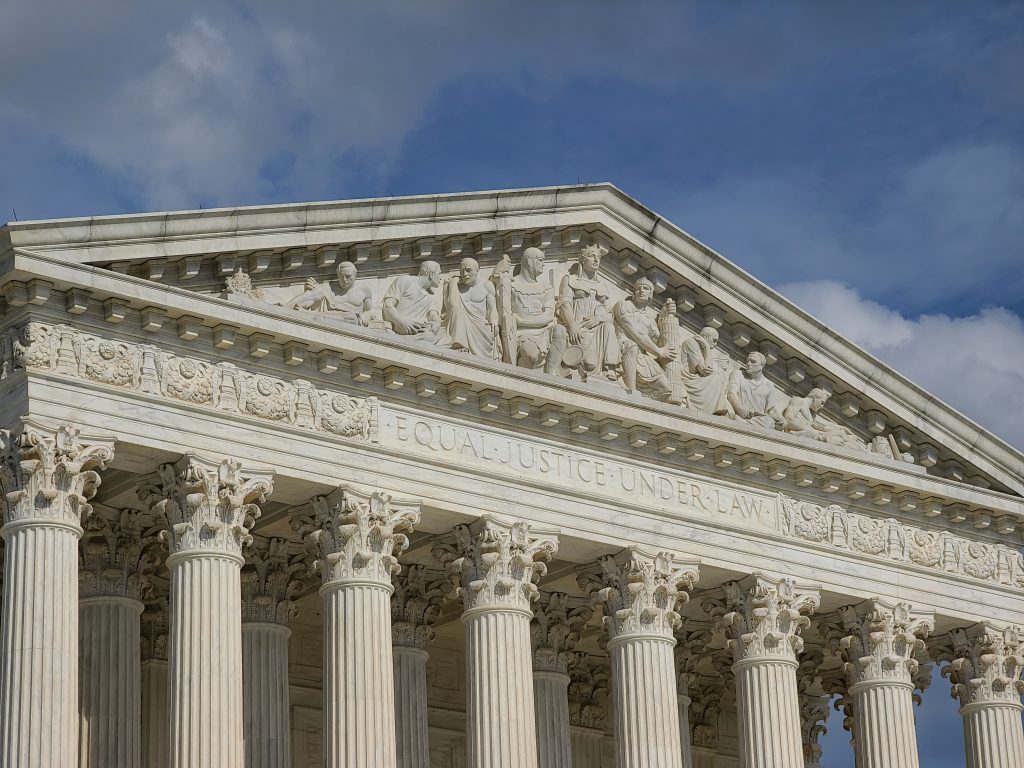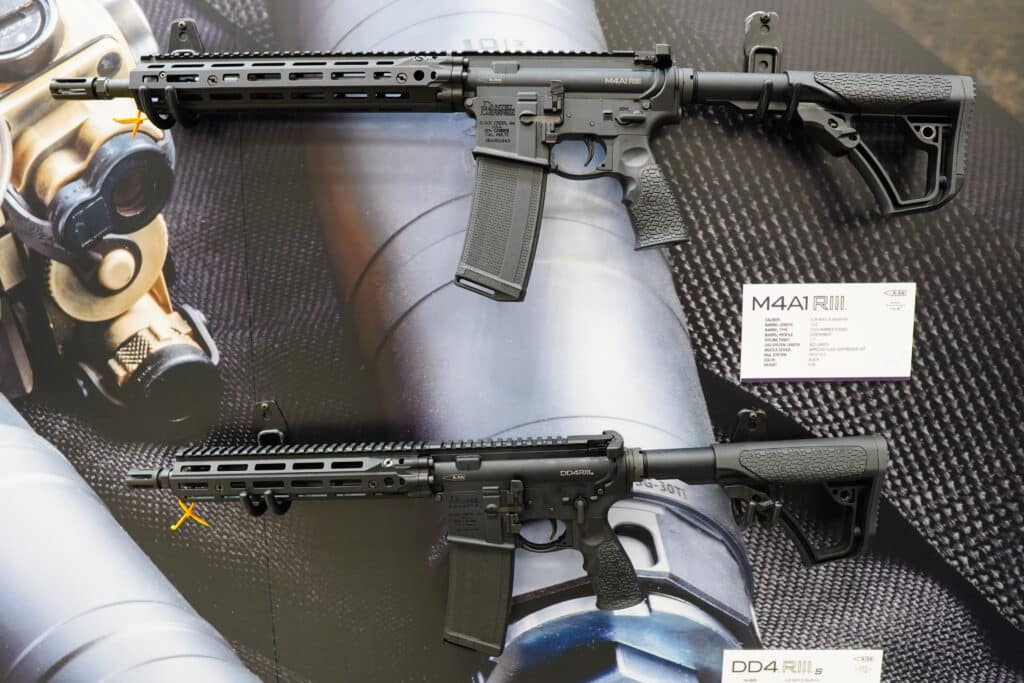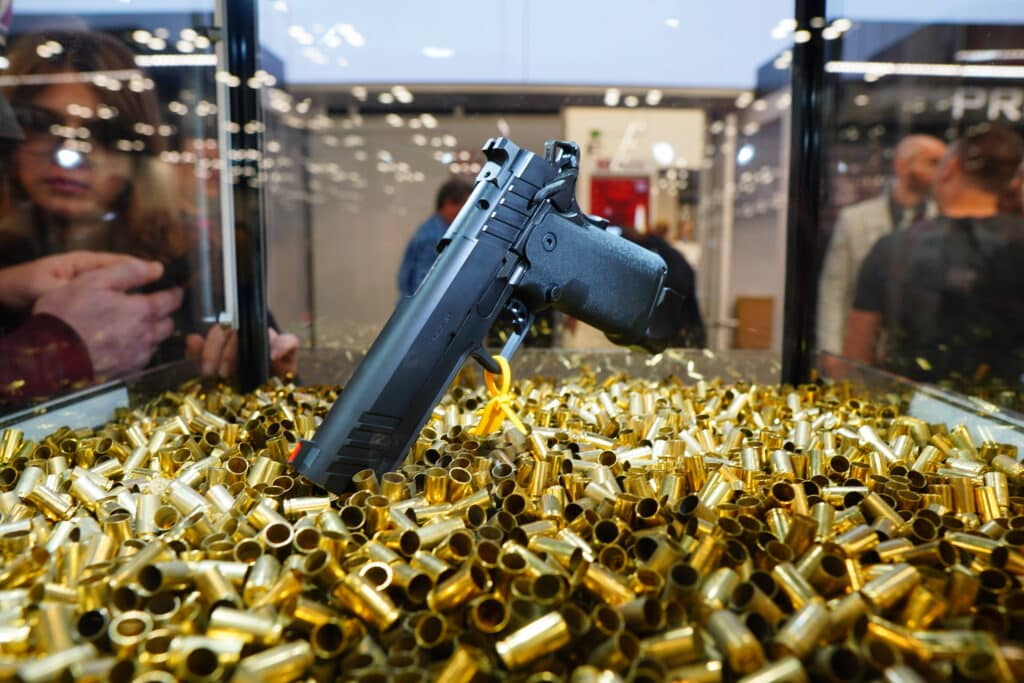The Sixth Circuit’s ruling against the bump stock ban may have been a rebuke of a policy created by former President Trump but it also puts President Biden’s executive gun orders on shakier ground.
Contributing Writer Jake Fogleman explains that Biden’s bans on “ghost guns” and pistol braces are formatted in the same way as the bump stock ban. They suffer from all the same shortcomings. So, they have all the same legal vulnerabilities too.
I examine the debate around a new “red flag” proposal in Tennessee as the state attempts to respond to last month’s Nashville school shooting. The Republican governor seems more committed to addressing common critiques of the temporary confiscation orders than any other politician to try and tackle the issue. But are the reforms he’s offered up going to satisfy civil libertarians or gun-rights advocates?
Illinois’s solution to mass shootings saw a huge setback on Friday when a federal judge ruled its “assault weapons” ban likely violates the Second Amendment. The judge said lawmakers had not only disregarded the Supreme Court’s 2022 ruling in Bruen but intentionally defied it. So, the state can no longer enforce the law as the court case proceeds up the food chain.
Plus, gun-rights scholar David Kopel joins the podcast to provide an overview of the political and legal challenges facing “assault weapons” bans across the country.

Analysis: The Latest Bump Stock Rulings Could Spell Doom for Biden Gun Bans [Member Exclusive]
By Jake Fogleman
The Supreme Court has more incentive than ever to weigh in on the Trump-initiated bump stock ban. If it does, the implications could extend to Biden’s gun orders.
On Tuesday, a three-judge panel for the Sixth Circuit Court of Appeals ruled in favor of a Kentucky man who challenged the legality of the ATF’s administrative ban on bump stocks. The unanimous panel ruled that it is unclear whether bump stocks fit within the current statutory definition of “machinegun” because of the multitude of existing legal opinions on the matter—including from the ATF itself. Therefore, the court determined that the definition should be interpreted to exclude them.
“An Act of Congress could clear up the ambiguities, but so far Congress has failed to act,” Judge Ronald Lee Gilman, a Clinton appointee, wrote on behalf of the court in Hardin v. Garland. “The Bureau of Alcohol, Tobacco, Firearms and Explosives (the ATF) has been on both sides of this issue, with its current regulation (the Rule) banning bump stocks as a machinegun part. In this situation, the rule of lenity that is applicable to criminal offenses requires us to rule in favor of Hardin.”
In other words, because the legal experts tasked with evaluating the regulation and the agency that administered it can’t seem to agree on whether bump stocks are machineguns, an average citizen cannot be subject to criminal enforcement.
The ruling is significant for two reasons.
The first is that it now marks the second time this year alone that a federal appeals court has ruled against the ban. In January, the Fifth Circuit Court of Appeals determined that the prohibition was clearly wrong.
“A plain reading of the statutory language, paired with close consideration of the mechanics of a semi-automatic firearm, reveals that a bump stock is excluded from the technical definition of ‘machinegun’ set forth in the Gun Control Act and National Firearms Act,” Judge Jennifer Walker Elrod wrote for the majority in Cargill v. Garland.
With two federal appeals courts having now called the ban into question—one in far more forceful terms than the other—more may follow. Additionally, the Supreme Court may feel compelled to weigh in. Before this year, federal appellate courts had all upheld the ban in various challenges. When those decisions were ultimately appealed to the Supreme Court, the justices denied the request to review those decisions in each and every case.
With circuit courts now split on the ban’s legality and, in some cases, divided on the rationale for why the ban is unlawful, the question is more ripe than ever for Supreme Court clarification.
That, in turn, could be significant for another reason: the potential ramifications for President Biden’s ATF rules on unfinished gun parts and pistol braces. Like former President Trump in the case of bump stocks, President Biden also directed the ATF to issue new rules banning firearm parts. Much like with bump stocks, the parts he sought to ban were also previously blessed by the ATF as legal for years before a politically-directed reversal. That means they could be susceptible to the same legal infirmities identified in the rulings against the bump stock ban.
“The viability of competing interpretations is exemplified not only by the myriad and conflicting judicial opinions on this issue, but also by the ATF’s own flip-flop in its position,” Judge Gilman wrote of that ban.
Those “flip-flops” refer to no less than ten separate determination letters issued by the agency’s Firearms Technology Industry Services Branch (FITSB) to various bump stock manufacturers between 2008 and 2017, assuring them that they were not machineguns.
“In order to use the installed device, the shooter must apply constant forward pressure with the non-shooting hand and constant rearward pressure with the shooting hand,” former FITSB Chief John Spencer wrote in a 2010 determination letter. “Accordingly, we find that the ‘bump-stock’ is a firearm part and is not regulated as a firearm under Gun Control Act or the National Firearms Act.”
Similar letters were issued as recently as April 2017, just six months before the Las Vegas mass shooting that prompted Trump to order the agency to reverse its position.
A similar paper trail exists for the ATF’s past position toward unfinished firearm parts and pistol braces attached to rifles with barrels shorter than 16 inches. So, courts may determine that the ATF has once again demonstrated its interpretations of federal gun laws are not clear nor enforceable.
The Supreme Court may be an unfavorable venue for the ATF rules, as the conservative majority has already shown it is suspicious of administrative power it views as exceeding Congressionally delegated authority.
Of course, it remains to be seen if the Court will agree to take up a bump stock case. It could be that the Court continues to kick the can on the question despite the divergent opinions on the matter developing in the lower federal courts. After all, it only agrees to hear about one percent of all cases that apply for certiorari every year.
The Department of Justice is also calling for the Court to take the case, which may add to the urgency. If it does take up the case, the outcome could have significant implications for the millions of gun owners affected by the ATF rules without ever addressing a single Second Amendment question.

Federal Court Blocks Illinois ‘Assault Weapons’ Ban
By Stephen Gutowski
Illinois can not ban the sale of AR-15s and other popular firearms.
That’s the ruling U.S. District Judge Stephen P. McGlynn handed down on Friday. He found the state’s “assault weapons” ban and ammunition magazine capacity limits likely violate the Constitution and issued a preliminary injunction preventing enforcement of the Protect Illinois Communities Act (PICA). He said it flies in the face of the Second Amendment.
“Can the senseless crimes of a relative few be so despicable to justify the infringement of the constitutional rights of law-abiding individuals in hopes that such crimes will then abate or, at least, not be as horrific?” Judge McGlynn wrote in Barnett v. Raoul. “More specifically, can PICA be harmonized with the Second Amendment of the United States Constitution and with Bruen? That is the issue before this Court. The simple answer at this stage in the proceedings is ‘likely no.’”
The ruling is another win for gun-rights advocates in the wake of the Supreme Court’s ruling in New York State Rifle and Pistol Association v. Bruen, which set a higher standard of review for gun laws. It casts new doubt on whether assault weapons bans in other states can survive scrutiny under Bruen.
PICA was passed in response to the 2022 Highland Park attack, where a shooter used an AR-15 variant to kill seven people and injure 48 more. It was only the second statewide ban on assault weapons, defined as semi-automatic centerfire guns with detachable magazines and at least one other banned feature like a pistol grip or telescoping stock, in 20 years. Washington became the third earlier this week.
“Enough is enough,” Pritzker said of the ban. “The people of this state deserve a real assault weapon ban, one that has a real accounting of weapons currently in circulation and a real chance at ceasing the flow of more weapons of war immediately.”
As in Delaware and Washington, gun-rights advocates immediately challenged the Illinois ban in state and federal court. It was blocked on constitutional grounds by a state judge in January. Now Judge McGlynn has done the same.
“There is no question that the right to armed self-defense is limited by PICA, and in some cases, may be prohibited altogether,” he wrote.
Judge McGlynn, a Trump appointee to the U.S. District Court for the Southern District of Illinois, ruled on a consolidation of several challenges to the law. He said the ban more than just infringes on residents’ gun rights.
“PICA did not just regulate the rights of the people to defend themselves; it restricted that right, and in some cases, completely obliterated that right by criminalizing the purchase and the sale of more than 190 ‘arms,’” McGlynn wrote.
The Second Amendment Foundation, Firearms Policy Coalition, Gun Owners of America, the Gun Owners Foundation, Federal Firearms Licensees of Illinois, and Guns Save Life were all plaintiffs in the consolidated cases. The gun-rights groups celebrated the ruling as a win but acknowledged the fight isn’t over.
“While this may only be the end of ‘Round One,’ it’s certainly a good start in putting an end to a law we are convinced is entirely unconstitutional,” Alan Gottlieb of the Second Amendment Foundation said.
“We will continue to hammer the point home to anyone who hopes to infringe on our rights – fall in line, or we will make you,” Sam Paredes of the Gun Owners Foundation said in a statement.
Governor Pritzer’s office said they plan to continue defending the law.
“The administration is confident that as the case continues, this critical public safety law will ultimately be upheld as constitutional,” Olivia Kuncio, a spokesperson for the governor, told The Reload.
Judge McGlynn said the Illinois ban appears not just to disregard the Supreme Court’s previous rulings on gun rights but actively push against them.
“The Supreme Court in Bruen and Heller held that citizens have a constitutional right to own and possess firearms and may use them for self-defense,” he wrote. “PICA seems to be written in spite of the clear directives in Bruen and Heller, not in conformity with them.”
He further argued that state governments can’t infringe on the rights of citizens even when its stated goal, such as ensuring public safety, is laudable.
“Whether well-intentioned, brilliant, or arrogant, no state may enact a law that denies its citizens rights that the Constitution guarantees them,” Judge McGlynn wrote. “Even legislation that may enjoy the support of a majority of its citizens must fail if it violates the constitutional rights of fellow citizens.”
Podcast: The Fate of ‘Assault Weapons’ Bans According to Gun-Rights Scholar David Kopel [Member Early Access]
By Stephen Gutowski
Another federal judge ruled on Friday that so-called assault weapons bans likely violate the Second Amendment.
So, the Illinois ban is blocked for now. But Washington’s was just signed. And Delaware’s 2022 ban is still standing. Elsewhere, bans on the popular guns, including the AR-15, have been forestalled by political reality.
Independence Institute’s David Kopel understands the fight well having just gone through it in his home state of Colorado, where Democrats who control the government weren’t able to push a ban over the finish line. But he has also filed many court briefs and written even more books or academic papers on the topic from a pro-gun point of view. He joins the show to discuss the political and legal landscape in the fight over assault weapons bans.
What stopped Colorado’s ban from going forward? Why has there been a sudden resurgence in blue states pushing for the bans? What is the legal argument against them? What is the state of the numerous lawsuits against AR-15 bans across the country?
And, most importantly, will the Supreme Court take up an assault weapons ban case soon? If so, what are they likely to decide?
Plus, Contributing Writer Jake Fogleman and I discuss the wide-reaching implications of the bump stock ban being stuck down by another federal appeals court.
The full episode is available on your favorite podcasting app or by clicking here. Video of the show is also available on our YouTube channel. As always, Reload Members get access on Sunday. Everyone else can listen or watch on Monday.
Come on the Podcast
One of the many perks of a Reload membership is the opportunity to appear on the podcast. We’ve had a lot of people on the show from all kinds of backgrounds. It’s one of my favorite segments since it gives us all a better insight into the community that makes this publication possible. If you want to come on the show, just reply to this email and let me know!

Analysis: Will Tennessee GOP Governor’s Red Flag Proposal Change the Debate? [Member Exclusive]
By Stephen Gutowski
The Volunteer State is the place to watch for the country’s most interesting gun law debate right now.
As gun policy moves forward along preestablished partisan lines in red and blue states, Tennessee is the one place where a policy outside those lines has some chance of passing. Republican Governor Bill Lee, motivated by last month’s Nashville school shooting, is pushing the Republican-controlled legislature to pass a modified “red flag” law, which he has relabeled an “order of protection” law. But, unlike many previous proposals, Lee appears to be working to address common critiques levied against the temporary gun confiscation orders.
“Throughout the last couple of weeks, I have worked with members of the General Assembly – constitutionally minded, second amendment protecting members – to craft legislation for an improved Order of Protection Law that will strengthen the safety and preserve the rights of Tennesseans,” Lee said last week. “We all agree that dangerous, unstable individuals who intend to harm themselves or others should not have access to weapons. And that should be done in a way that requires due process and a high burden of proof, supports law enforcement and punishes false reporting, enhances mental health support, and preserves the Second Amendment for law-abiding citizens.”
Since gaining prominence as a possible solution for mass shootings in the wake of the 2018 Parkland shooting, “red flag” laws have been dogged by complaints that they don’t offer sufficient protections for the rights of those accused of being a threat to themselves or others.
In most states that have adopted them, the civil orders can be filed by a wide array of groups, including some where nearly anyone can file for one. They don’t provide a public defender for those accused. They can be granted in ex parte hearings where the accessed isn’t even notified of the proceedings. And it can take weeks after their guns are seized before subjects of the orders can challenge them.
Lee identified these shortcomings as the main problem with policies in other states that he said “don’t deliver the right results.”
“They don’t actually preserve the constitutional rights of Tennesseans in the best way possible, and they don’t actually get to the heart of the problem of preventing tragedies,” he said. “This is hard. I’ve said that all along.”
He’s announced plans for a special session to pass the expanded protection orders. That was requested by GOP House Caucus Chairman Jeremy Faison, who said it was unlikely a bill could be put together with enough support to pass before the end of the regular session. While Lee hasn’t backed any specific bill yet, he has announced the sort of changes he wants.
First, a judge can’t issue an order without the person accused of being a danger being present during the hearing. Second, the accused will have access to a public defender. Third, making a false accusation would be a felony.
A mental health evaluation would also be part of the proceedings.
Depending on how those ideas are spelled out in actual legislation, that would make Tennessee’s proposal significantly different from previous extreme risk protection orders in other states. If it can get through a legislature with a Republican supermajority in both houses, it may set a new template for these measures. It may even make them more palatable in purple or red states.
But significant hurdles remain. House Republicans have already called it a “non-starter.” And Governor Lee’s proposal does not address all major critiques of “red flag” laws.
For instance, many gun-rights advocates believe these orders are misguided primarily because they focus entirely on the accused’s access to guns. If, the argument goes, the accused is truly a danger to themselves or others, just taking away their firearms is a completely incomplete solution to the problem. They would still be out on their own with access to all sorts of other means to harm themselves or others.
Often a more substantial legal or mental health response is needed to stop somebody who is considering carrying out a mass shooting. And every state already has a process for involuntary commitment, preventing a potentially dangerous person from accessing guns or other weapons.
However, the counter-argument is that there is an extremely high bar to have somebody involuntarily committed. Justifiably so, given that it is a harsh restriction on all of their rights for at least a short time. And it forces somebody to forfeit their gun rights for life.
“Red flag” laws are meant to be a middle ground where it is easier to intervene with somebody demonstrating signs they are a threat to themselves but may not have done enough to justify involuntary commitment. But making it easier to separate somebody from a constitutionally-protected right, even temporarily, will always come with legitimate concerns. The question now is whether a balance that will satisfy those civil liberty concerns is possible and, if so, whether Tennessee can find it.
But this is the first significant effort to do so in several years.
That’s it for now.
I’ll talk to you all again soon.
Thanks,
Stephen Gutowski
Founder
The Reload







